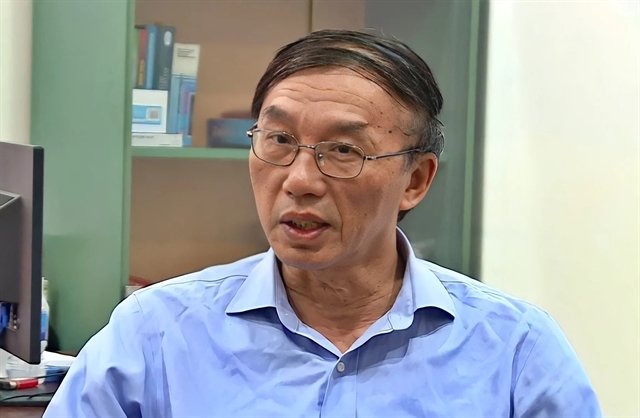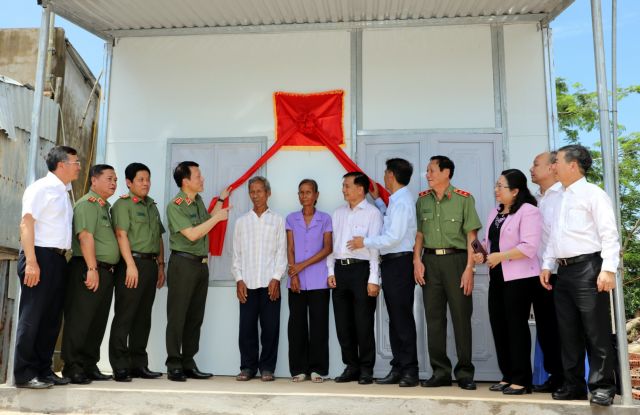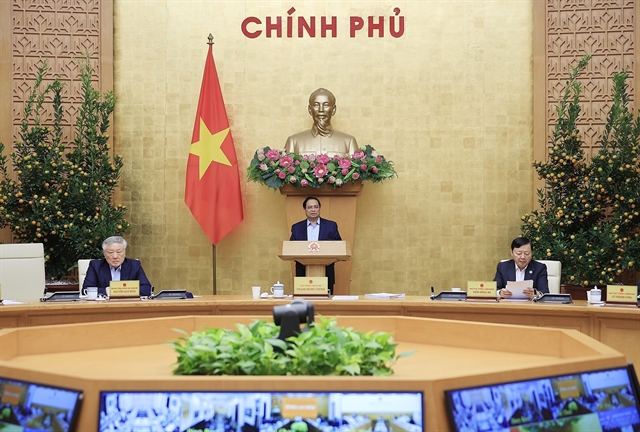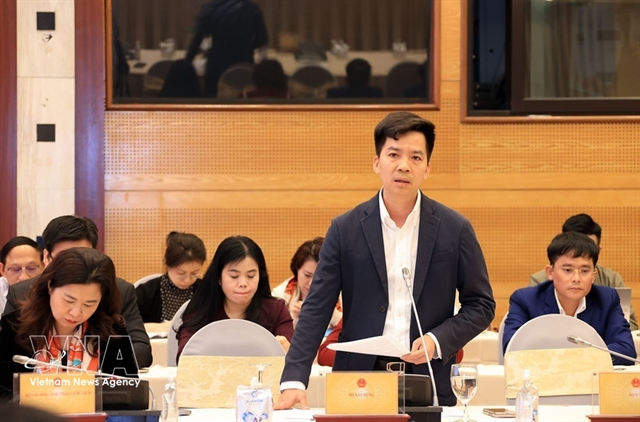 Society
Society

 |
| Local authorities present a new home to a family in poverty in Sóc Trăng Province. — VNA/VNS Photo Trung Hiếu |
HCM CITY — Multiple provinces across the southern region have been working to continue progress on ensuring residential land and housing for ethnic minorities, especially impoverished households.
A stable place to live is a great contribution to improving people’s livelihoods, and therefore the local socio-economic development goals.
The southern province of Sóc Trăng has built approximately 10,000 houses out of charity, and nearly 33,200 houses as part of Programme 134, which aims to provide production, housing and domestic water support for poor ethnic communities.
This is one of the key focuses of the province due to the multiple difficulties in livelihoods that local ethnic minorities are facing.
Director of Sóc Trăng’s Department of Labour, Invalids and Social Affairs Võ Thanh Quang said that in 2021 and 2022, through a provincial Party Committee’s campaign, resources from local authorities, organisations and individuals had been mobilised to build nearly 3,500 houses at the total cost of VNĐ174 billion (US$7.4 million).
Among these houses, almost 1,300 were given to poor households of Khmer ethnicity, each worth VNĐ50 million ($2,100).
In the first six months of 2023, Sóc Trăng constructed around 1,350 residences for the poor with a total budget of VNĐ67.5 billion ($2.9 million), of which 1,200 houses were made possible with the support of the Ministry of Public Security and philanthropists.
The project is expected to be completed before Independence Day on September 2 this year.
Điền Hùng, a Khmer beneficiary of this project said: “I didn’t know when I could have the means to build a house and settle down. Now that the province provided support with this ‘solidarity’ house, I feel very happy.
“I was given VNĐ50 million to build my house, and our family covers the labour cost for workers ourselves.
“Now that we have a home, I only need to focus on working to improve our livelihood.”
In Châu Thành District of Trà Vinh Province, with 300sq.m of land and VNĐ50 million given to build a proper house, Thạch Nhựt’s family also got out of poverty and enjoy a stable life.
He and his wife were informal workers with uncertain incomes, and had been living in a makeshift shed on a piece of land their parents left them.
Meanwhile, the southern An Giang Province has built two residential areas, Châu Phong and Vĩnh Chương, which are home to nearly 300 households of Chăm people. Two more areas are in development.
An Giang has 28 ethnic minorities of over 119,000, accounting for 5.2 per cent of the province’s population. Among them, more than 2,800 households, or almost 11,200 people, follow Islam.
Bình Phước Province also has been striving to reduce the number of poor households by 1,000 every year.
In 2023, with an estimated budget of more than VNĐ120 billion ($5 million) for the programme, the province set out to resolve residential land and housing difficulties for nearly 680 households.
The family of Điểu Đơm and Thị Bớt in Bù Gia Mập District is one of the programme’s beneficiaries.
Last year, with a combination of VNĐ46 million from the programme, VNĐ40 million from the district’s bank for social policies, and VNĐ60 million from their own saving, the couple managed to build a proper house.
Having a place to settle down gave them the motivation to continue working and sending their children to school, they said.
Similar initiatives are being carried out in Đồng Nai, Vĩnh Long and Bạc Liêu provinces.
Mobilising resources
Hầu A Lềnh, Minister-Chairman of the Committee for Ethnic Minorities Affairs has required southern provinces to comprehensively implement solutions for raising funds with the aim to realise the national target programme of socio-economic development among ethnic minority and mountainous regions in the 2021-30 period.
He also called for mobilising resources outside of the state budget, and the engagement of businesses in supporting and effectively using the social policy credits.
The Bank for Social Policies said that multiple measures had been taken to respond to the borrowing needs of policy beneficiaries, especially people in poverty.
These include allocating funding from the State budget and providing capital for social policy credit programmes.
At the local level, deputy chairwoman of Sóc Trăng People’s Committee Huỳnh Thị Diễm Ngọc said that the province would continue to review and identify ethnic households that meet the requirement for housing support.
She added that Sóc Trăng had set the goal to resolve over 90 per cent of the cases lacking residential land and housing among poor ethnic minority households by 2025.
Trà Vinh People’s Committee chairman Lê Văn Hẳn said that the localities would continue to make use of support from state programmes and social resources to ensure land and housing for ethnic minorities, while also encouraging them to improve production and livelihoods.
The province also planned to enhance communication activities to reduce dependence on external support and promote self-reliance among the people on the way out of poverty. — VNS




